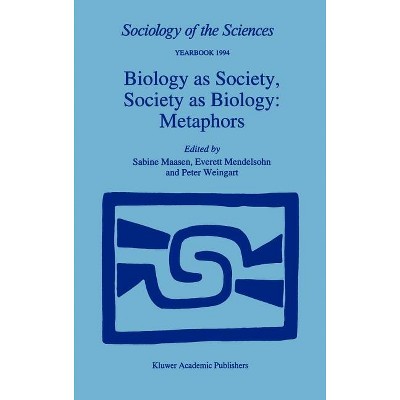Sponsored

Plasticity in the Life Sciences - by Antonine Nicoglou
$115.00
In Stock
Eligible for registries and wish lists
Sponsored
About this item
Highlights
- Analyzes the reasons why biologists have referred to and continue to refer to plasticity.
- About the Author: Antonine Nicoglou is associate professor of philosophy of science at the University of Tours.
- 320 Pages
- Science, Philosophy & Social Aspects
Description
About the Book
"Since the early twentieth century, plasticity has become an important theoretical concept in biology. Some even wondered whether plasticity has acquired in biology the theoretical importance that the concept of the gene enjoyed at the beginning of the last century. In this historical and epistemological analysis, Antonine Nicoglou shows how the recurrence of the general idea of plasticity throughout the history of the life sciences indicates its essential role in the way we think about life processes. She also argues that although plasticity has become a key element in thinking about an "extended synthesis" in evolution, its role for contemporary biology is not so limited. Rather, as mobilized in contemporary biology, the concept of plasticity most often seeks to account for the specificity of living systems. The book is divided into two parts, with the first taking up the history of plasticity from Aristotle to contemporary biology. Then, the second part of the book offers an original way of distinguishing between different phenomena described by 'plasticity.' In the process, she explores what has led some biologists to speak of plasticity as a way of overcoming genetic determinism"--Book Synopsis
Analyzes the reasons why biologists have referred to and continue to refer to plasticity. Plasticity has become an important topic in biology, with some even wondering if it has now acquired the theoretical importance in biology that the concept of the gene enjoyed at the beginning of the last century. In this historical and epistemological study, philosopher Antonine Nicoglou shows how the recurrence of the general idea of plasticity--throughout the history of the life sciences--indicates its essential role in the way we think about life processes. Although plasticity has become a key element in new evolutionary thinking, she argues, its role in contemporary biology is also not insignificant. Rather, as mobilized in contemporary biology, plasticity most often seeks to account for the specific nature of living systems. The book is divided into two parts. The first takes up the history of plasticity from Aristotle to contemporary biology; the second part offers an original way of distinguishing between different phenomena described by "plasticity." In the process, the author explores what has led some biologists to speak of plasticity as a way of overcoming genetic determinism.Review Quotes
"Sometimes metaphorical, sometimes concrete, from Aristotle to the modern-day, plasticity concepts have been invoked in theories of embryology, heredity, and organismic change with a multitude of meanings implicit in the use. Philosopher Antonine Nicoglou systematically and expertly guides the reader through a long and complex story." -- "Choice"
"Philosophers of biology have been increasingly interested in the concept of plasticity in recent years, but a detailed philosophical treatment of the topic has yet to appear. Nicoglou's excellent book therefore fills a major need. Nicoglou traces the history of the concept of plasticity and its use in different biological disciplines from Aristotle to the present, bringing out a wide range of significant continuities and differences and illuminating the varying relation of plasticity to crucial concepts such as variation, diversity, novelty, adaptation, regulation, and more. As well as being an essential read for anyone interested in the lively contemporary discussions of plasticity, this is a fine example of the integrated historical and philosophical approach to understanding biology."--John Dupré, author of "Processes of Life: Essays in the Philosophy of Biology"
About the Author
Antonine Nicoglou is associate professor of philosophy of science at the University of Tours.Dimensions (Overall): 9.0 Inches (H) x 6.0 Inches (W) x .81 Inches (D)
Weight: 1.38 Pounds
Suggested Age: 22 Years and Up
Number of Pages: 320
Genre: Science
Sub-Genre: Philosophy & Social Aspects
Publisher: University of Chicago Press
Format: Hardcover
Author: Antonine Nicoglou
Language: English
Street Date: December 6, 2024
TCIN: 1006101172
UPC: 9780226837147
Item Number (DPCI): 247-50-1441
Origin: Made in the USA or Imported
If the item details aren’t accurate or complete, we want to know about it.
Shipping details
Estimated ship dimensions: 0.81 inches length x 6 inches width x 9 inches height
Estimated ship weight: 1.38 pounds
We regret that this item cannot be shipped to PO Boxes.
This item cannot be shipped to the following locations: American Samoa (see also separate entry under AS), Guam (see also separate entry under GU), Northern Mariana Islands, Puerto Rico (see also separate entry under PR), United States Minor Outlying Islands, Virgin Islands, U.S., APO/FPO
Return details
This item can be returned to any Target store or Target.com.
This item must be returned within 90 days of the date it was purchased in store, shipped, delivered by a Shipt shopper, or made ready for pickup.
See the return policy for complete information.











